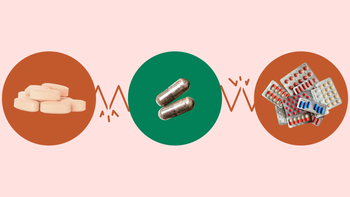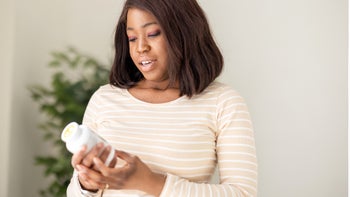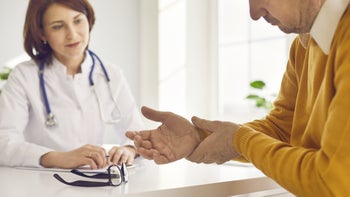
How Much Biotin Is Too Much?
Key takeaways:
Biotin is a nutrient that helps turn the food you eat into energy for your body and brain. You usually get enough biotin from your diet, but you can also get it from dietary supplements when needed.
Biotin is safe to take — even at high doses. But biotin supplements can affect the results of certain blood tests.
Talk to your primary care provider (PCP) if you think you’ve taken too much biotin. You can also contact Poison Control if you’re having trouble reaching your PCP.
Access savings on related medications

If you’ve looked into products that support hair, nail, or skin health, you may have found biotin supplements. And while biotin is often marketed for these uses, it’s actually an important vitamin that helps your body turn food into energy.
When it comes to taking biotin supplements, they’re generally safe — especially when you stick to the recommended amount. But can you take too much biotin? Let’s look at the science behind the side effects of biotin.
What is biotin?
Biotin is one of the B vitamins — vitamin B7 to be exact. Biotin is an important nutrient that supports many different processes in the body. But its main job is to help create energy from the carbohydrates, fats, and proteins that you eat every day.
Search and compare options
In most cases, people get enough biotin from their diet. Meats, nuts, and certain vegetables — such as sweet potatoes and spinach — are all sources of biotin.
Biotin is also available as an over-the-counter (OTC) dietary supplement. It’s available by itself, in combination with other B vitamins, or as part of a multivitamin. It’s usually taken as an oral tablet, and it comes in doses ranging from 10 mcg to 5,000 mcg (0.01 mg to 5 mg).
Biotin is included in many supplements meant to improve hair, nail, and skin health. But there isn’t a lot of evidence that taking biotin helps with hair or nail growth.
What’s a safe biotin daily dose?
How much biotin per day is enough? It varies by age and whether you’re pregnant or nursing.
Age | Recommended daily amount |
Birth to 6 months | 5 mcg |
Infants 7-12 months | 6 mcg |
Children 1-3 years | 8 mcg |
Children 4-8 years | 12 mcg |
Children 9-13 years | 20 mcg |
Teens 14-18 years | 25 mcg |
Adults 19+ years | 30 mcg |
Pregnant people | 30 mcg |
People who are nursing | 35 mcg |
Biotin deficiency is rare. But some people can have a harder time getting the recommended daily amount of biotin. You may need more biotin if you:
Take seizure medications like carbamazepine or phenobarbital
Have alcohol use disorder
Are pregnant or nursing
There’s also a rare genetic condition called biotinidase deficiency that affects the way biotin is processed in your body. People with this condition need to consume more biotin to make sure they are getting enough.
Read more like this
Explore these related articles, suggested for readers like you.
Is it possible to overdose on biotin?
Probably not. Biotin is a water-soluble vitamin. This means that extra biotin isn’t stored in your body. Instead, extra biotin leaves the body in your urine. Because of this, it’s difficult for water-soluble vitamins like biotin to build up to dangerous levels if you have healthy kidneys.
To date, there have not been any reports of biotin toxicity, even in studies where people took very large doses of biotin. In one study, people with multiple sclerosis were treated with high doses of biotin every day. While the recommended daily dose of biotin for most adults is 30 mcg, this study used 300 mg doses. This is 10,000 times the recommended daily dose. But even with these high doses, people didn’t experience any side effects.
So far, experts have not found an unsafe daily dose of biotin. It’s possible that there’s no upper limit of how much biotin a person can safely take. But more research is needed to know for sure.
What are the side effects of too much biotin?
It’s hard to say since there are no reports of side effects from biotin supplements. But in one study in rats, extremely high doses of biotin did cause side effects like:
Stomach ache
Insomnia
Excessive thirst
Excessive urination
While the same side effects could happen in humans, it’s not clear how much a human would need to take to develop these side effects.
Are there any other risks associated with taking too much biotin?
Yes. Biotin supplements can interfere with some important blood tests. Examples include:
Troponin levels tests: This is a blood test that’s used to help diagnose heart strain and heart attacks. Biotin can cause a false negative troponin test. This means the test results look normal, when they’re not.
Thyroid hormone levels tests: Taking biotin can affect blood tests that check on your thyroid gland. People taking biotin supplements may have falsely low thyroid stimulating hormone (TSH), and falsely high levels of triiodothyronine (T3) or thyroxine (T4). This can lead to an incorrect diagnosis of hyperthyroidism (overactive thyroid). It can also make it more difficult to choose the right dose of thyroid medication for people with hypothyroidism (underactive thyroid).
Vitamin D levels tests: There’s evidence that biotin can affect the results of blood tests to check vitamin D levels. People taking biotin supplements may have falsely high vitamin D levels on some tests.
Hormone levels tests: Biotin supplements may also affect the results of testing for other hormones including parathyroid hormone. And it can also affect tests for reproductive hormones like follicle-stimulating hormone and luteinizing hormone.
And keep in mind that vitamin supplements like biotin aren’t regulated by the FDA in the same way prescription medications are.
Let your healthcare professional know if you’re taking a biotin supplement. It will help them correctly interpret your test results. Or, they may ask you to stop taking biotin for a few days before getting your labs done.
What should I do if I accidentally take too much biotin?
If you’ve taken a large dose of biotin, or believe you’re experiencing side effects from taking too much biotin, you should call Poison Control at 1-800-222-1222. And if your symptoms feel serious, don’t hesitate to seek immediate medical care at an emergency room.
The bottom line
Biotin is a vitamin that helps turn the food you eat into the energy you need. Overall, biotin supplements are considered safe when used as directed. There are no documented cases of biotin overdose. But biotin supplements can affect the results of certain important blood tests. Before starting a biotin supplement, talk to your healthcare professional or pharmacist to make sure it’s safe for you to take.
Why trust our experts?


References
American Thyroid Association. (2018). Thyroid function tests. Clinical Thyroidology for the Public.
Bistas, K. G., et al. (2023). Biotin. StatPearls.
Carter, G. D., et al. (2020). Biotin supplementation causes erroneous elevations of results in some commercial serum 25-hydroxyvitamin d (25OHD) assays. The Journal of Steroid Biochemistry and Molecular Biology.
Council for Responsible Nutrition. (2013). Biotin. Vitamin & Mineral Safety 3rd Edition.
Espiritu, A. I., et al. (2021). High-dose biotin for multiple sclerosis: A systematic review and meta-analyses of randomized controlled trials. Multiple Sclerosis and Related Disorders.
Gifford, J. L., et al. (2018). Biotin interference: Underrecognized patient safety risk in laboratory testing. Canadian Family Physician.
Higdon, J. (2023). Biotin. Linus Pauling Institute Oregon State University.
Li, D., et al. (2020). AACC guidance document on biotin interference in laboratory tests. Journal of Applied Laboratory Medicine.
National Institutes of Health Office of Dietary Supplements. (2021). Biotin.
National Institutes of Health Office of Dietary Supplements. (2022). Biotin.
National Organization for Rare Disorders. (2019). Biotinidase Deficiency.
Saleem, F., et al. (2023). Biotin deficiency. StatPearls.
U.S. Food and Drug Administration. (2019). Biotin interference with troponin lab tests - Assays subject to biotin interference.
Walth, C. B., et al. (2018). Response to: “Rethinking biotin therapy for hair, nail, and skin disorders”. Journal of the American Academy of Dermatology.





























